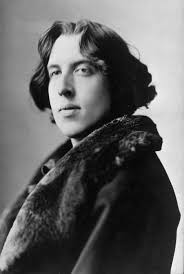The Picture of Dorian Gray Page #31
The Picture of Dorian Gray is a Gothic and philosophical novel by Oscar Wilde, first published complete in the July 1890 issue of Lippincott's Monthly Magazine. Fearing the story was indecent, prior to publication the magazine's editor deleted roughly five hundred words without Wilde's knowledge.
"You call yesterday the past?" "What has the actual lapse of time got to do with it? It is only shallow people who require years to get rid of an emotion. A man who is master of himself can end a sorrow as easily as he can invent a pleasure. I don't want to be at the mercy of my emotions. I want to use them, to enjoy them, and to dominate them." "Dorian, this is horrible! Something has changed you completely. You look exactly the same wonderful boy who, day after day, used to come down to my studio to sit for his picture. But you were simple, natural, and affectionate then. You were the most unspoiled creature in the whole world. Now, I don't know what has come over you. You talk as if you had no heart, no pity in you. It is all Harry's influence. I see that." The lad flushed up and, going to the window, looked out for a few moments on the green, flickering, sun-lashed garden. "I owe a great deal to Harry, Basil," he said at last, "more than I owe to you. You only taught me to be vain." "Well, I am punished for that, Dorian--or shall be some day." "I don't know what you mean, Basil," he exclaimed, turning round. "I don't know what you want. What do you want?" "I want the Dorian Gray I used to paint," said the artist sadly. "Basil," said the lad, going over to him and putting his hand on his shoulder, "you have come too late. Yesterday, when I heard that Sibyl Vane had killed herself--" "Killed herself! Good heavens! is there no doubt about that?" cried Hallward, looking up at him with an expression of horror. "My dear Basil! Surely you don't think it was a vulgar accident? Of course she killed herself." The elder man buried his face in his hands. "How fearful," he muttered, and a shudder ran through him. "No," said Dorian Gray, "there is nothing fearful about it. It is one of the great romantic tragedies of the age. As a rule, people who act lead the most commonplace lives. They are good husbands, or faithful wives, or something tedious. You know what I mean--middle-class virtue and all that kind of thing. How different Sibyl was! She lived her finest tragedy. She was always a heroine. The last night she played--the night you saw her--she acted badly because she had known the reality of love. When she knew its unreality, she died, as Juliet might have died. She passed again into the sphere of art. There is something of the martyr about her. Her death has all the pathetic uselessness of martyrdom, all its wasted beauty. But, as I was saying, you must not think I have not suffered. If you had come in yesterday at a particular moment--about half-past five, perhaps, or a quarter to six--you would have found me in tears. Even Harry, who was here, who brought me the news, in fact, had no idea what I was going through. I suffered immensely. Then it passed away. I cannot repeat an emotion. No one can, except sentimentalists. And you are awfully unjust, Basil. You come down here to console me. That is charming of you. You find me consoled, and you are furious. How like a sympathetic person! You remind me of a story Harry told me about a certain philanthropist who spent twenty years of his life in trying to get some grievance redressed, or some unjust law altered--I forget exactly what it was. Finally he succeeded, and nothing could exceed his disappointment. He had absolutely nothing to do, almost died of ennui, and became a confirmed misanthrope. And besides, my dear old Basil, if you really want to console me, teach me rather to forget what has happened, or to see it from a proper artistic point of view. Was it not Gautier who used to write about la consolation des arts? I remember picking up a little vellum-covered book in your studio one day and chancing on that delightful phrase. Well, I am not like that young man you told me of when we were down at Marlow together, the young man who used to say that yellow satin could console one for all the miseries of life. I love beautiful things that one can touch and handle. Old brocades, green bronzes, lacquer-work, carved ivories, exquisite surroundings, luxury, pomp--there is much to be got from all these. But the artistic temperament that they create, or at any rate reveal, is still more to me. To become the spectator of one's own life, as Harry says, is to escape the suffering of life. I know you are surprised at my talking to you like this. You have not realized how I have developed. I was a schoolboy when you knew me. I am a man now. I have new passions, new thoughts, new ideas. I am different, but you must not like me less. I am changed, but you must always be my friend. Of course, I am very fond of Harry. But I know that you are better than he is. You are not stronger--you are too much afraid of life--but you are better. And how happy we used to be together! Don't leave me, Basil, and don't quarrel with me. I am what I am. There is nothing more to be said." The painter felt strangely moved. The lad was infinitely dear to him, and his personality had been the great turning point in his art. He could not bear the idea of reproaching him any more. After all, his indifference was probably merely a mood that would pass away. There was so much in him that was good, so much in him that was noble. "Well, Dorian," he said at length, with a sad smile, "I won't speak to you again about this horrible thing, after to-day. I only trust your name won't be mentioned in connection with it. The inquest is to take place this afternoon. Have they summoned you?" Dorian shook his head, and a look of annoyance passed over his face at the mention of the word "inquest." There was something so crude and vulgar about everything of the kind. "They don't know my name," he answered. "But surely she did?" "Only my Christian name, and that I am quite sure she never mentioned to any one. She told me once that they were all rather curious to learn who I was, and that she invariably told them my name was Prince Charming. It was pretty of her. You must do me a drawing of Sibyl, Basil. I should like to have something more of her than the memory of a few kisses and some broken pathetic words." "I will try and do something, Dorian, if it would please you. But you must come and sit to me yourself again. I can't get on without you." "I can never sit to you again, Basil. It is impossible!" he exclaimed, starting back. The painter stared at him. "My dear boy, what nonsense!" he cried. "Do you mean to say you don't like what I did of you? Where is it? Why have you pulled the screen in front of it? Let me look at it. It is the best thing I have ever done. Do take the screen away, Dorian. It is simply disgraceful of your servant hiding my work like that. I felt the room looked different as I came in." "My servant has nothing to do with it, Basil. You don't imagine I let him arrange my room for me? He settles my flowers for me sometimes--that is all. No; I did it myself. The light was too strong on the portrait."
Translation
Translate and read this book in other languages:
Select another language:
- - Select -
- 简体中文 (Chinese - Simplified)
- 繁體中文 (Chinese - Traditional)
- Español (Spanish)
- Esperanto (Esperanto)
- 日本語 (Japanese)
- Português (Portuguese)
- Deutsch (German)
- العربية (Arabic)
- Français (French)
- Русский (Russian)
- ಕನ್ನಡ (Kannada)
- 한국어 (Korean)
- עברית (Hebrew)
- Gaeilge (Irish)
- Українська (Ukrainian)
- اردو (Urdu)
- Magyar (Hungarian)
- मानक हिन्दी (Hindi)
- Indonesia (Indonesian)
- Italiano (Italian)
- தமிழ் (Tamil)
- Türkçe (Turkish)
- తెలుగు (Telugu)
- ภาษาไทย (Thai)
- Tiếng Việt (Vietnamese)
- Čeština (Czech)
- Polski (Polish)
- Bahasa Indonesia (Indonesian)
- Românește (Romanian)
- Nederlands (Dutch)
- Ελληνικά (Greek)
- Latinum (Latin)
- Svenska (Swedish)
- Dansk (Danish)
- Suomi (Finnish)
- فارسی (Persian)
- ייִדיש (Yiddish)
- հայերեն (Armenian)
- Norsk (Norwegian)
- English (English)
Citation
Use the citation below to add this book to your bibliography:
Style:MLAChicagoAPA
"The Picture of Dorian Gray Books." Literature.com. STANDS4 LLC, 2024. Web. 26 Nov. 2024. <https://www.literature.com/book/the_picture_of_dorian_gray_869>.




Discuss this The Picture of Dorian Gray book with the community:
Report Comment
We're doing our best to make sure our content is useful, accurate and safe.
If by any chance you spot an inappropriate comment while navigating through our website please use this form to let us know, and we'll take care of it shortly.
Attachment
You need to be logged in to favorite.
Log In